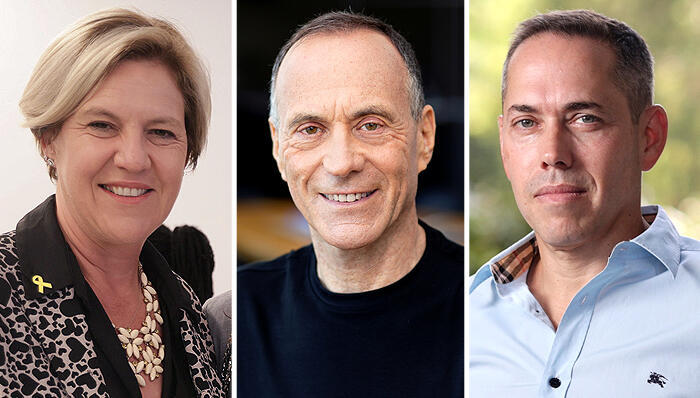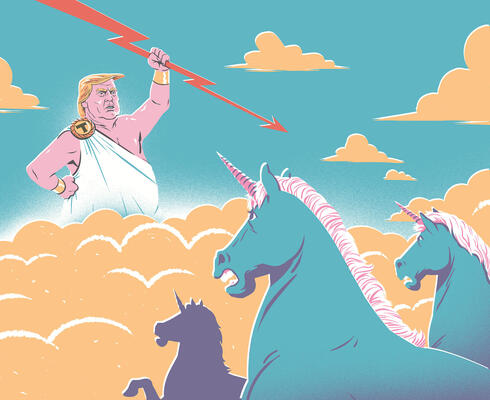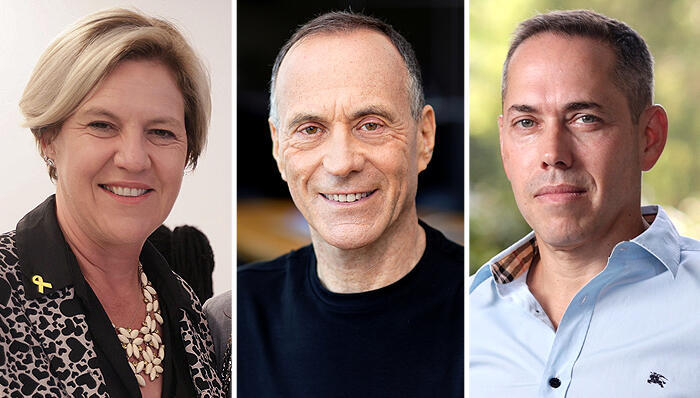
Most Promising Startups - 2025
“We’re looking at another year or two of pain and uncertainty before a new growth cycle begins”
Venture capital is drying up, IPOs are on ice, and Israeli tech faces a critical test of resilience.
This was supposed to be a completely different article. Back in February, it seemed 2025 would mark a major turning point for high-tech. For the first time since 2021, a new wave of IPOs was being discussed. Israel was poised to take part, with eToro submitting its prospectus to the U.S. Securities and Exchange Commission. The M&A scene also showed signs of revival, kicked off by Google’s $32 billion acquisition of Wiz. CoreWeave completed its IPO at a $23 billion valuation, and OpenAI raised a record-breaking $40 billion in private funding.
Wall Street had already started showing signs of strain early in the year, but expectations remained high. Many anticipated that the Trump administration would drive deregulation, open the doors to crypto, and create a supportive environment for IPOs and bullish prospectuses.
Then came April 2—what Trump dubbed “America’s Liberation Day.” In practice, he mostly liberated investors from the gains they had accumulated over the past year. His sudden policy moves reshuffled the deck for the tech sector, both globally and in Israel.
It’s not just Wall Street and Silicon Valley recalibrating expectations for 2025. Last week, the International Monetary Fund cut its global growth forecast from 3.2% to 2.8%, with a warning that further downgrades may follow. The outlook for the U.S. is even more pessimistic, with GDP growth expected to reach just 1.8%.
IMF economists noted that previous forecasts—finalized just before April—were discarded following Trump’s announcement of a trade war. So after a year of dramatic recovery, fueled by AI and quantum breakthroughs and lighter financial regulation, 2025 is instead shaping up to be a year of upheaval and heightened global tension, with fears of a new economic Cold War.
The immediate casualty is the stock market. Since the beginning of April, the S&P 500 has fallen 5.2%, the Nasdaq is down 5%, and daily volatility has surged. IPO activity has all but disappeared, while the price of gold continues to rise—a bad sign for tech, which thrives on risk-hungry investors.
Whether the decline continues or the markets simply stagnate, the shockwaves will soon hit private investment. As in 2022, when asset values plunged and institutional investors pulled back from venture capital and private equity, the current downturn threatens a similar chain reaction.
Adding fuel to the fire is a Trump administration policy to cut $9 billion in federal funding to top universities—particularly Ivy League schools—over what it described as their failure to address campus antisemitism. To absorb the blow, Yale, Princeton, and Harvard are reportedly considering taking on debt or liquidating portions of their endowments, reducing their ability and willingness to invest in venture funds.
This comes at a time when venture capital is already under strain. Years of underperformance have left many investors disillusioned. According to PitchBook, capital raised by VC funds in Q1 2025 was at its lowest level in a decade.
That’s bad news for early-stage startups. Many funds are still sitting on illiquid assets—paper gains from past investments that haven’t seen exits. Without IPOs or acquisitions to return capital, liquidity remains locked up. The result? A funding squeeze that’s fast becoming the dominant concern in Silicon Valley.
“There’s deep disappointment in Trump’s policies here in the Valley,” says Oded Hermoni, co-founder of J-Ventures and a longtime Silicon Valley resident. “Many investors on Wall Street and here are already talking about a two-year ‘winter’ for investments.”
While he says things aren’t entirely frozen yet, Hermoni notes his fund sent a memo to portfolio companies with three key messages:
- Conserve cash — stretch existing funds as long as possible.
- Close signed deals quickly — don’t delay funding rounds unless absolutely necessary.
- Relocate to the U.S. if applicable — especially for startups whose main market is there.
That last point, Hermoni explains, reflects an emerging reality: in uncertain times, customers and partners prefer to work with people physically close to them—one less risk factor to worry about. “I'm sure there will be a pause in funding, but I don’t believe all liquidity will dry up for two years. People still remember Sequoia Capital’s 'Black Swan' memo during COVID in 2020, warning of a long winter—yet by 2021, the market had surged, and it became one of the best years tech has ever had.”
"I Haven’t Felt Anything Like This Since the Cold War"
While the world isn't dealing with a singular shock like the COVID pandemic, the unfolding trade war—triggered by reciprocal tariff hikes—is largely uncharted territory for investors.
“This is something very rare,” says Haim Sadger, veteran investor and former Sequoia Capital partner, now at early-stage fund S-Capital. “I was at Sequoia during the dot-com crash in 2000 and during the financial crisis in 2008. Those were severe, but they were focused crises. What we’re seeing now is multi-dimensional.”
Sadger points to geopolitical tensions from Ukraine to the Middle East and an increasingly fractured world order. “I haven’t seen this level of tension since the Cold War,” he says. “We’re in a period of massive turbulence—not only due to global conflicts and economic instability, but also because the AI revolution is upending long-held assumptions.”
He believes we are currently in the eye of the storm, making it hard to predict whether Trump will dial back his tariff campaign or escalate further.
“I don’t know when we’ll emerge from this vortex or what the world will look like when we do, but I do know it can’t take too long — because companies, both large and small, simply don’t have the breathing room to withstand such extreme uncertainty,” adds Sadger. Still, he tries to offer an optimistic outlook for the near future: “We may end up emerging from this crisis in better shape than we entered it. Having been through past downturns, I always remind people that the best investments are often made in the toughest times. Sequoia Capital’s best investment was in Cisco — made in 1987, right after Black Monday. Back then, Sequoia’s legendary co-founder, Michael Moritz, said they ‘heard the sound of checkbooks closing.’ But in Cisco’s case, they opened one and wrote a check for $2.7 million. They held onto the company until its IPO, turning that investment into billions.”
In Sadger’s view, the immediate impact will be felt most by large, mature companies, while early-stage startups may still attract interest from venture capital: “I’ve never seen a crisis that lasts five or eight years. So the startups just getting off the ground today will likely mature just in time for a stronger economy.”
What about growth companies?
“The market was far more primed for mergers and acquisitions a year ago than it is now, because large companies have shut down new investments,” Sadger says. “I see CEOs of huge firms making decisions that are half-guesses because they no longer know where the market is headed. In that kind of environment, big deals stop happening. Anyone who expected to be acquired this year needs to roll up their sleeves and get back to work.”
Still, Sadger doesn’t see this as catastrophic. “It’s not a big drama. These companies are usually cash-flow positive by this stage and don’t need to raise from local VCs. They can also turn to private equity funds.”
Related articles:
Avi Eyal, founding partner of Entrée Capital — one of the world’s top-performing early-stage venture funds — is similarly cautious about the near-term. “Even if Trump changes his policy in the coming months — and I do think the tariffs will be revised within three months — the uncertainty will persist at least through the end of the year,” he says. “But that’s only part of the problem. The IPO market probably won’t reopen before the end of 2025, and M&A activity is also slowing. In Israel, most startups are built for acquisition, so many will find themselves in distress.”
That’s why VCs are getting anxious, Eyal says. “It’s not clear who will buy the startups in their portfolios or how they’ll exit their investments. Add to that the changes on Wall Street and decisions by U.S. university endowments — which have historically invested heavily in venture capital — to liquidate some of their alternative portfolios. Combine that with the weak historical performance of many VC funds, and you could see a real shift away from venture capital as an investment channel for institutional investors.”
According to Eyal, Israeli venture capital is taking a double hit: “The geopolitical and domestic instability is driving many potential investors away. Institutional investors abroad are saying there’s no reason to invest in Israeli funds — especially since plenty of global VCs are active here and provide sufficient exposure to Startup Nation. I fear some Israeli funds simply won’t succeed in raising new capital. That could create a serious problem for the local ecosystem.”
If Eyal’s prediction proves accurate, the impact on Israeli startups — especially mature ones — could be significant. “There are quite a few unicorns here, along with companies valued in the hundreds of millions, that may have to learn how to remain private for longer,” he says. “We’re looking at another year or two of pain and uncertainty before a new growth cycle begins. The problem is that when that new cycle comes, investors will be chasing the new startups — not the old ones.”
Secondary Funds: A Partial Solution
One increasingly popular tool for unlocking capital in a frozen IPO and M&A market is the secondary fund. Several such funds are already operating in Israel. They acquire stakes in private companies — or entire portions of a VC’s portfolio — typically at a discount to the book value. This allows the original fund to return capital to investors, while the secondary fund gains time (typically 5–7 years) to help companies grow and eventually exit under better market conditions.
“The day after the market plunge in early April, we started getting offers to purchase shares in companies whose IPOs were delayed or canceled,” says Fiona Darmon, formerly a partner at JVP and now co-founder of Sunvest, a secondary fund she launched with Merav Weinryb. Sunvest is currently completing a fundraising round in the tens of millions of dollars. “Funds and investors are desperate for liquidity. Without distributions to LPs, there’s no fuel for the next generation of funds. Secondary deals are becoming central to the industry because they help companies grow while staying private.”
While IPOs remain frozen, Darmon believes M&A activity could resume soon.
Despite the gloomy outlook, Eyal sees one hopeful trend: “Reservists and active-duty soldiers returning to civilian life are founding new startups. That’s where the next wave could come from. Looking ahead, we need to reduce Israel’s dependence on the U.S. market and tap into new geographies. The Wiz deal is a milestone and it should be leveraged. These kinds of deals may only come once in a generation, but they give global investors a reason to look toward Israel.”

